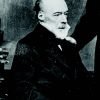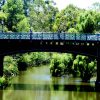Robert Torrens’ accomplishments by most standards were formidable. He was a writer of more than ninety books, a decorated military officer, a distinguished political economist, a successful newspaper proprietor, a liberal though sometimes reluctant member of the House of Commons and the Chairman of at least two government commissions including the South Australian Colonization Commission, which led to the formation of the colony of South Australia.
His was a long and fruitful life. However, he was very often in restless dispute with his superiors, an obsequious petitioner to those he thought might advance his cause and full of personal insecurities. This partly explains why he rarely received any garlands of intellectual esteem in his own time. His contribution to nineteenth-century colonial theory and the economic strength of the British Commonwealth is undeniable and we would do well to take ‘account of the ubiquitous influence of this wayward but authentic genius’.
The young officers of the South Australian Colonization Commission and some of their closest supporters who were about to take up office in the new colony were euphoric in their praise of Torrens. As their Chairman the Colonel was perhaps the most instrumental person in bringing the daring colonial project to fruition. He was central from the beginning and it was claimed he had proposed a system of colonisation well in advance of Edward Gibbon Wakefield. Torrens’ involvement was so crucial he was placed at the centre of Colonel William Light’s Adelaide plan, having the small river which meandered through the new settlement in his name. It was the first act of nomenclature beyond that of royalty, although last named in the published list.
Torrens was the quintessential Irish nationalist. As a young man he came to abhor the poverty and squalor he could see around him. Drawing on what must have been a classical education, particularly in economics, he began to address the big questions in life: equality, security and national wealth. In 1808, not long into his career in the Marines, he issued a monograph entitled The economists refuted, in which he addressed some of these questions. He immediately came under notice as a writer and thinker. Soon he was addressing a succession of questions in several publications: Catholic emancipation, the repeal of the Corn Laws, reciprocity in trade, employment, land use, the deployment of capital and the role of currency in the maintenance of economic stability gave him reason to put pen to paper.
In the 1820s his attention turned to emigration and colonisation as a potential and logical way of reversing the plight of the Irish and reducing pauperism throughout the British Isles. His plan was to ‘shovel paupers out to the colonies’, or so it was said by some of his critics, and by doing so to simultaneously relieve some of the population pressure in Ireland. Unsurprisingly, his calls for emigration were not popular with government in the 1820s because they required a financial commitment from Treasury which it was not prepared to meet.
With the advent of Wakefield’s theory of systematic colonisation, Torrens modified his views and became an enthusiastic supporter of the concept. He then agreed that colonial ‘waste land’ sold at a ‘sufficient price’ might raise enough money to build an independent Emigration Fund. He joined the newly formed National Colonization Society and in company with Robert Gouger, Wakefield’s most ardent disciple, began to strongly prosecute the case at the Colonial Office. They lobbied incessantly between 1830 and 1834 and were rewarded in August 1834 when the South Australia Act was passed. As a result, and by calling on promised patronage, Torrens became Chairman of the South Australian Colonization Commission and corralled the project through a maze of obstacles until it materialised in 1836.
Colonel Robert Torrens was the first surviving son of the Reverend Robert Torrens (1720–90) and his wife Elizabeth (1750–90), the third daughter of the Reverend Skeffington Bristow. He was raised as an Anglo-Irishman. He was educated in his home parish of Tamlaght O’Crilly and at the Derry Diocesan School, where it is believed he was introduced to the rudiments of economic theory at a time when Adam Smith’s Wealth of nations was breaking news.
At 16 Torrens was commissioned as Second Lieutenant in the Marine Corp. A year later, on 18 November 1797, he was promoted to First Lieutenant. He later served on land at Chatham, Plymouth and Woolwich before joining detachments on board Royal Navy escorts in and around British waters and the English Channel. In 1806 Torrens was promoted to Captain and in August 1810 was placed in command of the garrison on Anholt Island, in Denmark, from where a naval gun station controlled any seaward approach to Copenhagen. In 1819 he became brevet Lieutenant Colonel.
In 1801 Torrens was stationed on board the HMS Glenmore in Cork Harbour, where he met and later that year married Charity Chute, the daughter of Richard Chute of Chute Hall, Roxborough, County Kerry, in Cork. Between 1803 and 1816 they had five children: Charity (b. 1803), John Skeffington (b. 1804), Jane Austen (b. 1809), Robert Richard Chute (b. 1812) and Cherry Herbert (b. 1816). Robert Richard Chute Torrens was later to become an early premier of South Australia and the widely acclaimed although sometimes disputed instigator of what has become known as the Torrens Land Title System.
Colonel Robert Torrens was a complex man. He derived his income from several truncated careers, firstly as a marine officer and then spasmodically as a liberal politician. For a time he was the proprietor of a liberal newspaper, which was coincidently a defacto forum for the Whigs. From 1834 he served firstly as Chairman of the South Australian Colonization Commission and then as Chairman of Lord John Russell’s Colonial Land and Emigration Commission, to which he was appointed in 1840. This effectively made him the most senior government officer in Britain’s colonial empire, if only for a brief time.
When South Australia fell into an economic depression in 1841 and it was revealed Torrens had contravened Lord Glenelg’s earlier directive precluding commissioners from investing privately in the colonies while in office, Torrens agreed to resign. Thereafter he devoted the last twenty years of his life to his economic publications, most notably on banking and finance. He was, however, granted a life pension of £200 per annum from July 1851.
In each of these steps in his life, Torrens demonstrated a certain uneasiness, a kind of tension as he struggled against events. His achievements were considerable, but it was never enough. He craved recognition and status, which always seemed to lie just out of reach, and he was always looking for more. He repeatedly sought either promotion or redress.
Towards the 1820s he became estranged from his first wife and moved to London, where he was stationed at Woolwich. Shortly after being promoted to Lieutenant Colonel by brevet, he married Esther Sarah Serle, the daughter of a previous Under Secretary to the Colonies. This gave him entree to polite society, the promise of an independent income and means sufficient to become a substantial newspaper proprietor. Torrens set out to dominate the evening newspaper market with a style of radical journalism which put the Whigs and the Philosophical Radicals in a good light.
Because many of his theories were bedded in ‘utility’ he was well acquainted with David Ricardo, James Mill, John Stuart Mill, Malthus and others with whom he joined in what would be described today as a ‘think tank’ – the Political Economy Club which Torrens and Richardo initiated in 1821. This Club, which lasted for decades and which met regularly to discuss socioeconomic and classical economic questions, is where Torrens found his true place in history, among the renowned classical economists of all time.
He made a worthwhile contribution in the House of Commons. Being vitally interested in colonisation Torrens fell in line behind Grote and the Philosophical Radicals in support of the South Australian Colonization Bill. This was probably his greatest passion. From the moment he joined the National Colonization Society in 1830 he never lost his zest and enthusiasm for the project. In company with Gouger he hounded the Colonial Office until it was a fait accompli.
Outside of his parliamentary responsibilities and subsequent work as a commissioner, Colonel Robert Torrens was associated in a number of ways with other organisations. He was elected a Fellow of The Royal Society on 17 December 1818. He was an inaugural member of the South Australian Association from December 1833 and in 1834 joined Charles Babbage, William Wolryche Whitmore, Richard Jones and Thomas Malthus in the Statistical Society of London. He was also a member of the Society for the Extinction of the Slave Trade and for the Civilization of Africa (June 1839). Both he and his son, also Robert, were members of the Reform Club. His association with Brougham ensured he was familiar with the Society for the Diffusion of Useful Knowledge, and occasionally he gave lectures at the London Mechanics’ Institute.
At the time of the Reform Bill, Colonel Torrens was already beyond middle age. In the context of the street names in Adelaide, only Matthew Flinders was born before him and Governor Hindmarsh was five years younger. Most of those named in Adelaide’s streets were a generation younger.
In in May 1835 that Colonel Torrens was at last granted his wish for a commissioned appointment and offered the chairmanship of the nine-member South Australian Colonization Commission. Repeated obsequious appeals to Brougham and services rendered to the Whig party and the Philosophical Radicals had finally paid dividends. He was appointed Chairman and Rowland Hill became Secretary. Together they gathered around them a strong body of young enthusiasts who believed implicitly in the Wakefield scheme, whereupon they immediately set about scanning the country for intending colonists.
Torrens considered himself the founder of South Australia. He expressed as much in a letter to Lord John Russell in 1841: ‘The colony of South Australia, devised by Mr. Wakefield, was planted by me … The planting of 15 [thousand] settlers in South Australia was the result of my exertions’.
Colonel Robert Torrens died of an abscess on the lung during the spring of 1864 at his home at 16 Craven Hill, Bayswater, London. Like Sir William Molesworth before him, he is buried at Kensal Green.







Comments